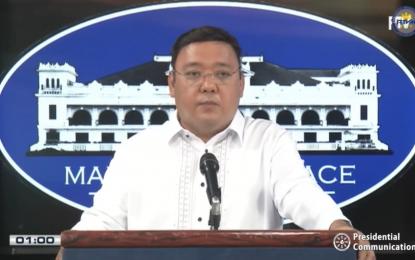
Presidential Spokesperson Harry Roque
MANILA – The national government is now allowing mass gatherings for the provision of critical government services and authorized humanitarian activities under all quarantine levels, according to new guidelines of the Inter-Agency Task Force for the Management of Emerging Infectious Diseases (IATF-EID).
During the Laging Handa public briefing on Monday, Presidential Spokesperson Harry Roque presented the updated IATF-EID guidelines under Resolution No. 38 which the task force approved on Friday (May 22).
“Pinapayagan naman sa May 22 guidelines ang gatherings sa ilalim ng ECQ, MECQ na may kinalaman sa serbisyo ng pamahalaan at mga authorized humanitarian activity (Allowed under May 22 guidelines are gatherings that have something to do with government services and authorized humanitarian activity in areas under enhanced community quarantine and modified ECQ),” Roque said.
Under the latest IATF-ED guidelines, only selected mass gatherings are allowed in all levels of community quarantine including less strict general community quarantine (GCQ), and modified GCQ (MGCQ) provided these adhere to minimum health standards.
Religious gatherings in areas under MECQ shall be limited to five persons while religious gatherings in areas under GCQ are limited to 10 persons.
Limited operations in malls and shopping centers are also allowed in areas under MECQ and GCQ, except for leisure establishments and services which will continue to be closed.
Those below 21 years old and those 60 years old and above and those with immunodeficiency, comorbidity or other health risks and pregnant women may not enter malls and shopping centers "except when indispensable under the circumstances for obtaining essential goods, services, or work in establishments located therein".
Gatherings such as movie screenings, concerts, sporting events and other entertainment activities, community assemblies and non-essential work gatherings will only be allowed in areas under MGCQ, provided that participants will be limited to 50 percent of the venue or seating capacity.
Work in all public and private offices shall be allowed to resume physical work in full capacity with alternative arrangements for senior citizens, those with immunodeficiency, other health risks, and pregnant women.
Roque urged the public to continue taking precautions against the coronavirus disease 2019 (Covid-19) despite relaxed quarantine protocols.
He urged the public to continue practicing safe physical distancing, wearing of face masks, and good hygiene, stressing that these precautions will be part of the “new normal” until a vaccine against Covid-19 is developed.
“Dapat lang naman po tayong mabahala dito sa Covid-19 habang wala pa pong vaccine, habang wala pa pong gamot. Pero hindi naman po kinakailangan na itigil na natin ang ating mga buhay. Patuloy po tayo ngayong binubuksan na natin ang ekonomiya dahil kinakailangan naman nating buhayin ang ating mga kababayan (We should be worried about Covid-19 as there is no vaccine or medicine yet. But we don’t need to stop our economic activities. We will continue to reopen the economy because our people need to earn a living),” he said.
Roque made this reminder after results of the latest survey released by pollster Social Weather Stations (SWS) on Sunday showed that at least 87 percent of Filipinos are worried that anyone in their immediate family might catch Covid-19.
The May 4-10 SWS mobile phone survey, which interviewed 4,010 working-age Filipinos nationwide, found that 13 percent are not worried about catching the highly-infectious virus.
The worry about catching the virus is higher in Metro Manila and Visayas at 93 percent and 91 percent, respectively, compared to Mindanao and Balance Luzon at 85 percent and 84 percent, respectively.
Meanwhile, Roque said it is “possible” that Metro Manila, which is currently under MECQ, could transition to a GCQ if there will be a significant improvement in the country’s critical health care capacity, and economic factors.
Interior Secretary Eduardo Año said the government eyes the implementation of a barangay-based lockdown after the end of the MECQ in Metro Manila.
Metro Manila, Laguna, Bataan, Nueva Ecija, Pampanga, Zambales, and Angeles City are currently under MECQ while the rest of the areas in the country are under GCQ.
Only Cebu and Mandaue cities are under ECQ. (PNA)
